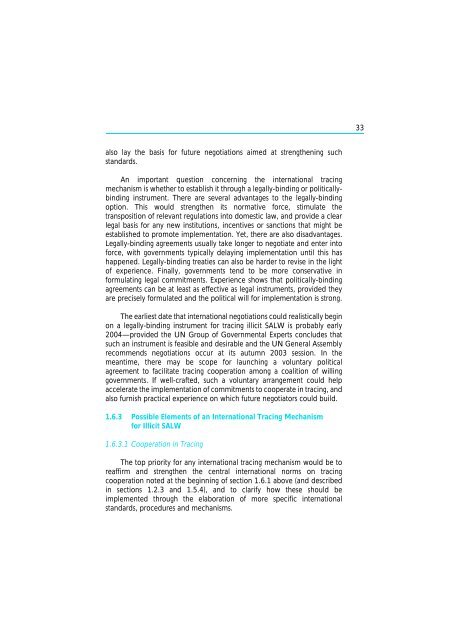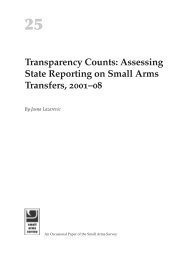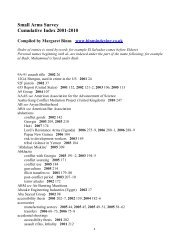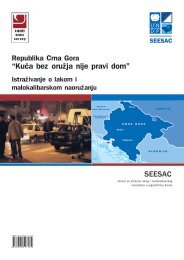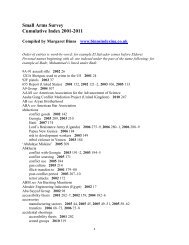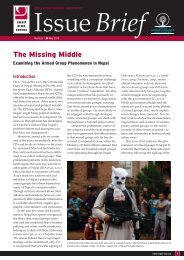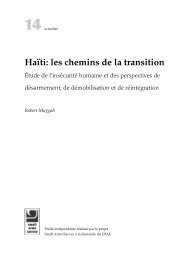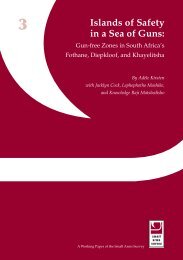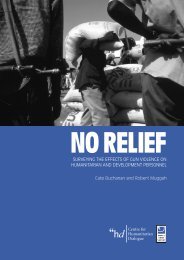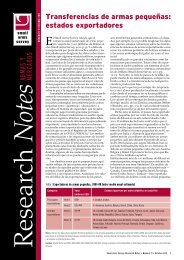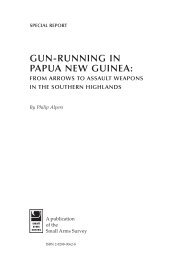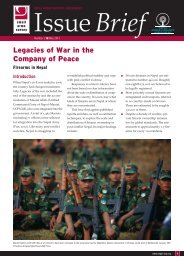The Scope and Implications of a Tracing Mechanism for Small Arms ...
The Scope and Implications of a Tracing Mechanism for Small Arms ...
The Scope and Implications of a Tracing Mechanism for Small Arms ...
You also want an ePaper? Increase the reach of your titles
YUMPU automatically turns print PDFs into web optimized ePapers that Google loves.
33<br />
also lay the basis <strong>for</strong> future negotiations aimed at strengthening such<br />
st<strong>and</strong>ards.<br />
An important question concerning the international tracing<br />
mechanism is whether to establish it through a legally-binding or politicallybinding<br />
instrument. <strong>The</strong>re are several advantages to the legally-binding<br />
option. This would strengthen its normative <strong>for</strong>ce, stimulate the<br />
transposition <strong>of</strong> relevant regulations into domestic law, <strong>and</strong> provide a clear<br />
legal basis <strong>for</strong> any new institutions, incentives or sanctions that might be<br />
established to promote implementation. Yet, there are also disadvantages.<br />
Legally-binding agreements usually take longer to negotiate <strong>and</strong> enter into<br />
<strong>for</strong>ce, with governments typically delaying implementation until this has<br />
happened. Legally-binding treaties can also be harder to revise in the light<br />
<strong>of</strong> experience. Finally, governments tend to be more conservative in<br />
<strong>for</strong>mulating legal commitments. Experience shows that politically-binding<br />
agreements can be at least as effective as legal instruments, provided they<br />
are precisely <strong>for</strong>mulated <strong>and</strong> the political will <strong>for</strong> implementation is strong.<br />
<strong>The</strong> earliest date that international negotiations could realistically begin<br />
on a legally-binding instrument <strong>for</strong> tracing illicit SALW is probably early<br />
2004—provided the UN Group <strong>of</strong> Governmental Experts concludes that<br />
such an instrument is feasible <strong>and</strong> desirable <strong>and</strong> the UN General Assembly<br />
recommends negotiations occur at its autumn 2003 session. In the<br />
meantime, there may be scope <strong>for</strong> launching a voluntary political<br />
agreement to facilitate tracing cooperation among a coalition <strong>of</strong> willing<br />
governments. If well-crafted, such a voluntary arrangement could help<br />
accelerate the implementation <strong>of</strong> commitments to cooperate in tracing, <strong>and</strong><br />
also furnish practical experience on which future negotiators could build.<br />
1.6.3 Possible Elements <strong>of</strong> an International <strong>Tracing</strong> <strong>Mechanism</strong><br />
<strong>for</strong> Illicit SALW<br />
1.6.3.1 Cooperation in <strong>Tracing</strong><br />
<strong>The</strong> top priority <strong>for</strong> any international tracing mechanism would be to<br />
reaffirm <strong>and</strong> strengthen the central international norms on tracing<br />
cooperation noted at the beginning <strong>of</strong> section 1.6.1 above (<strong>and</strong> described<br />
in sections 1.2.3 <strong>and</strong> 1.5.4), <strong>and</strong> to clarify how these should be<br />
implemented through the elaboration <strong>of</strong> more specific international<br />
st<strong>and</strong>ards, procedures <strong>and</strong> mechanisms.


